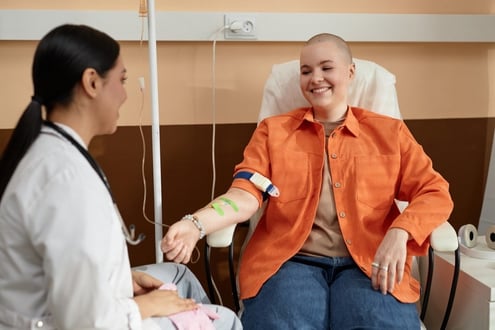PALB2: Options for Cancer Treatment
Cancer Treatment for People with Inherited Mutations
Testing positive for an inherited mutation may affect your treatment options or eligibility for clinical trials studying which treatments work best. The following are examples of situations where a mutation may play a part in treatment decision-making.
What are the surgical considerations for people with a mutation who are diagnosed with breast cancer?
Because of the high risk for a second breast cancer diagnosis, women who are diagnosed with breast cancer who test positive for an in may choose mastectomy rather than and radiation. Mutation carriers who undergo mastectomy are less likely to develop a second breast cancer.
Are there targeted therapies for treating cancer in people with a mutation?
PARP inhibitors are a type of that work by blocking a protein used to repair damaged . They were initially developed to treat cancers in people with an inherited or mutation. Since then, research has expanded use of PARP inhibitors to more situations. In some situations—but not all—PARP inhibitors have received approval for treating cancers in people with or other mutations.
Because mutations behave similarly to mutations, many experts believe that PARP inhibitors may work as well in people with mutations. For this reason, in 2021, the American College of Medical Genetics (ACMG) issued a guidance paper stating that PARP inhibitors could be used to treat cancers in people with mutations, just as they are used for or mutations, even in the absence of specific approval for .
People with a mutation who have been diagnosed with cancer may want to ask their doctor about therapy. If your insurance company denies coverage for treatment that is approved for use in or mutation carriers, you may be able to appeal this decision based on the ACMG guidelines. Visit our Appeal Library to download a sample appeal letter.
PARP inhibitors for and breast cancer
Although PARP inhibitors have not specifically received approval to treat breast cancer in people with mutations, the American Society of Medical Genetics released a paper suggesting that people with mutations and cancer should be considered for the same treatments and clinical trials as people with a or mutation. Below are guidelines for PARP inhibitors for treating breast cancer in people with a or mutation.
- Treatment for breast cancer: The PARP inhibitors, Lynparza (also known as ) and (also known as ) both have received approval for treating breast cancer caused by a mutation.
- Treatment for breast cancer: Based on results from a large clinical trial, experts recommend one year of the for people with , breast cancer who have an inherited mutation and who are at high risk for recurrence.
PARP inhibitors for cancer (mCRPC)
The PARP inhibitors, Lynparza () and () have received approval to treat , in people with a or other gene linked to a certain type of damage repair.
Clinical trials, such as NEPTUNE are looking at PARP inhibitors for treating early prostate cancer.
PARP inhibitors for advanced ovarian, or primary peritoneal cancer
Several PARP inhibitors have been approved to treat ovarian cancers at different stages of the disease. In some situations, a tumor known as an test ("") can help people with an inherited mutation and advanced ovarian cancer learn if they may benefit from a .
- after treatment
- testing can help women with an inherited mutation and advanced ovarian cancer learn if they may benefit from the Lynparza () in combination with bevacizumab as after platinum chemotherapy.
- is approved for in women with advanced ovarian, , or primary peritoneal cancer who had a complete or partial response to platinum-based chemotherapy. for does not require an test.
- after treatment of recurrent cancer
- and () are both approved for maintenance therapy in women with recurrent epithelial ovarian, , or primary peritoneal cancer who are in a complete or partial response to platinum based chemotherapy.
PARP inhibitors for pancreatic cancer
Although PARP inhibitors have not specifically received approval to treat pancreatic cancer in people with mutations, the American Society of Medical Genetics released a paper suggesting that people with mutations and cancer should be considered for the same treatments and clinical trials as people with a or mutation. The Lynparza is approved for maintenance treatment of pancreatic cancer in people with a mutation whose disease has not progressed after completing platinum-based chemotherapy.
PARP inhibitors for other advanced cancers with no treatment options
If you have a mutation and advanced cancer that no longer responds to standard therapy, you may want to talk with your doctor about additional testing to determine whether you might benefit from treatment with a , another or participation in a clinical trial.
In the News
Participate in Research
More Resources
Participate in Treatment Research
NePtune: Using PARP Inhibitors Before Surgery in Localized Prostate Cancer
Clinicaltrials.gov identifier: NCT05498272
Study of the Drug Olvi-Vec in Women with Ovarian Cancer
Clinicaltrials.gov identifier: NCT05281471









